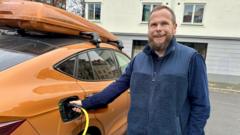Norway continues to set the standard in electric vehicle adoption, with electric cars currently representing nearly 90% of new sales and paving the way for a fossil fuel-free automobile industry.
Norway Set to Lead the Charge Towards a Fully Electric Vehicle Future

Norway Set to Lead the Charge Towards a Fully Electric Vehicle Future
Norway's bold move towards an all-electric car market showcases a shift in automotive sales and environmental policies, signaling a profound change for global car markets.
Norway, with a population of 5.5 million, has established itself as a frontrunner in electric vehicle (EV) adoption, boasting that 88.9% of new vehicles sold are electric. As oil and gas producer, Norway's transition to EVs is grounded in strong government policies, economic incentives, and a commitment to reducing emissions. Car dealerships, such as the prominent Harald A Møller in Oslo, have shifted entirely to electric cars, with the CEO, Ulf Tore Hekneby, emphasizing the inevitability of the electric future. An extensive network of charging stations supports this transition, with over 27,000 available nationwide.
Norway's longstanding support for EVs dates back to the 1990s, when tax breaks were introduced to encourage adoption. The shift has been facilitated by free parking, toll discounts, and eliminating VAT on EVs, effectively steering consumers’ choices away from traditional combustion engine vehicles. As of 2025, Norway aims for all new cars sold to be zero-emission, a goal within reach according to Deputy Transport Minister Cecilie Knibe Kroglund.
Despite its reliance on fossil fuels, Norway remains committed to sustainability, with renewable hydropower accounting for 88% of its electricity production. The country’s wealth, bolstered by oil and gas exports, allows for significant investment in EV infrastructure without the burden of domestic tax revenue from fossil fuels.
In a stark contrast, countries like the UK and the US lag behind significantly, with electric vehicles representing only 20% and 8% of new sales, respectively. Experts believe that Norway's approach, characterized by strong governmental support and infrastructure investment, offers a roadmap for other nations aiming to boost their own EV markets. As more consumers witness the economic benefits of EVs, this trend is likely to continue, pushing the automotive industry further towards an electric horizon.
Norway's longstanding support for EVs dates back to the 1990s, when tax breaks were introduced to encourage adoption. The shift has been facilitated by free parking, toll discounts, and eliminating VAT on EVs, effectively steering consumers’ choices away from traditional combustion engine vehicles. As of 2025, Norway aims for all new cars sold to be zero-emission, a goal within reach according to Deputy Transport Minister Cecilie Knibe Kroglund.
Despite its reliance on fossil fuels, Norway remains committed to sustainability, with renewable hydropower accounting for 88% of its electricity production. The country’s wealth, bolstered by oil and gas exports, allows for significant investment in EV infrastructure without the burden of domestic tax revenue from fossil fuels.
In a stark contrast, countries like the UK and the US lag behind significantly, with electric vehicles representing only 20% and 8% of new sales, respectively. Experts believe that Norway's approach, characterized by strong governmental support and infrastructure investment, offers a roadmap for other nations aiming to boost their own EV markets. As more consumers witness the economic benefits of EVs, this trend is likely to continue, pushing the automotive industry further towards an electric horizon.

















